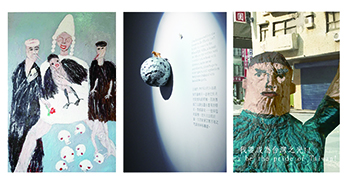
|
Once upon a future2020 10.23 - 11.28 |

Once upon a future
Venue: nca | nichido contemporary art
Date: October 23 (Fri.) ~ November 28 (Sat.)
Opening hours: Tue. ~ Sat. 11:00 – 19:00 (Closed on Sunday, Monday and National holidays)
Artists: Busui Ajaw / Au Sow-Yee / Chang Li-Ren
nca | nichido contemporary art is pleased to present the group exhibition “Once upon a future”. “Once upon a future” is a play on words from the common opening line “once upon a time” we find in fables and fairy tales. These stories are told in every corner of the world and many have been handed down through generations changing little by little all the while. Each of their imaginary, sometimes deformed aspects, has well-rooted origins, and reveals new historical facets by portraying historical background, culture, traditions and spirituality. There are still many lessons we can learn from them as they seem to embody the fear and anguish of our times, giving voice to those who are oppressed by the many forms of control that are present everywhere, yet they seem to hold hope, dreams and an ideal vision of the future. In a time where it is possible to collect a multitude of information through the spread of SNS, we can now share in real time what is happening worldwide, and we can also come across small stories we otherwise would have never heard of. On the other side, the overwhelming amount of information can cloud our judgement and, quite sometimes, lead us to misinterpret the truth.
While coming from different backgrounds, all three artists on view dig deep into their own personal experience and, travelling back and forth through history, each with their unique approach, touch many complicated and diverse issues that belong to contemporary societies. Moreover, they raise issues we, as well, are likely to face, looking at the future and at what it may lead us to.
Born in Taiwan, Chang Li-Ren (1983) creates original stories based on historical facts mainly in the form of installations, animation and video works. Borrowing the concept of “simulacre” (simulation) as elaborated by French philosopher Baudrillard (1929 – 2007), the artist is sending us a wake-up call as such simulation, a constant presence in our lives, can end up entirely destroying the line between reality and imagination, in a time that makes it possible to create ever real images, far more realistic than the reality obtained through the use of computers, television and other digital technologies.
“Battle City” is an animation video-work that addresses a variety of issues of our times such as religion, world powers, media and societal texture. All the models appearing in the video have been hand-made by the artist himself, taking him a total of seven years to complete the first installment of “Battle City” on view in this exhibition, with a second episode currently in production. The very realization process of this work represents Chang’s ultimate goal and can be definitely understood as the artist’s life-work.
Born in Malaysia, Au Sow-Yee (1978) shows a keen interest in the mechanism of images and investigates the relation among images, authority, politics and history through installation and video works. Loading her works with material from the colonial time and cold war era, such as movies, books, and documents, and with the local oral tradition, the artist is constantly trying to unravel the history of southeast Asia and Malaysia while moving back and forth between documentary and fiction.
On view in this exhibition, the work “Castle, Valley, Anonymous Island and Their Return to the Moon” focuses on the story of Jim Thompson (1906 -?) who mysteriously disappeared in the Malaysian highlands. The mysterious and obscure story, interweaving Au’s imagination with the many accounts surrounding Jim’s disappearance, seems to be creating a new historical truth by combining, as the video keeps rolling, scattered pieces of a puzzle, still leaving behind a veil of mystery.
*Jim Thompson was an American businessman famous for his contribution to Thai silk industry.
Born in Chiang Rai, in upper northern Thailand, Busui Ajaw (1986) creates paintings intimately connected to her background. Ajaw gained her artistic practice from her upbringing, born into an artisan family belonging to the Akha people, a semi-nomadic ethnic minority who lives across the border from the high mountains of Southeast Asia.
Part of her expressive language comes from the oral literature. Such literature, which was the way of the Akha people to hand down practices, traditions, history and culture, is being lost following the sudden and profound changes the recent spread of technology has brought about on their way of life.
Ajaw pieces together these fragments and transfers them on the canvas together with fragments from her personal experience of the world today.
*Courtesy of Chang Li-Ren, nichido contemporary art and Chi-Wen Gallery

